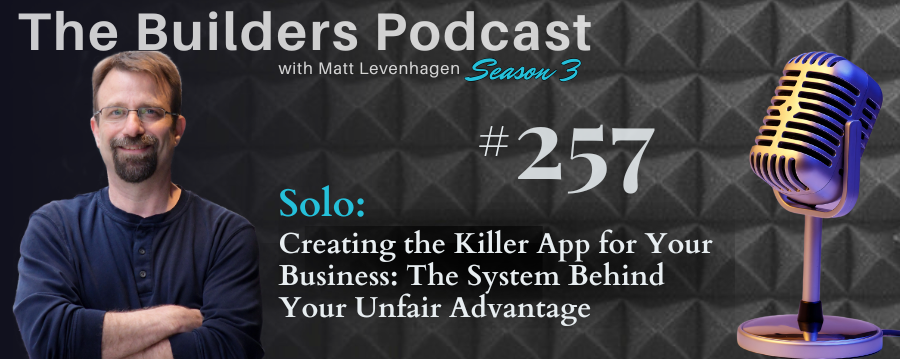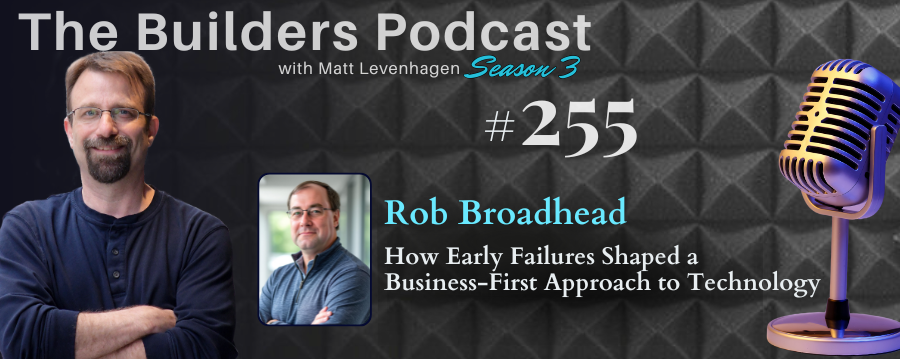
Description:
In this introspective episode of “The Builders,” host Matt Levenhagen takes a deep dive into the philosophy of lean startups, beyond the surface of initial business launches, and applies it to internal business processes and ventures.
His refreshing take on minimizing risk and fostering innovation through rapid, iterative testing of products and services comes to life through real-life examples drawn from his decades-long experience in the trenches of entrepreneurship and internet marketing.
Matt discusses his journey from testing various special reports to hitting gold with a report on PPC advertising, which eventually morphed into a robust 200-page guide and associated products.
Listen in as he unravels how this lean startup approach allowed him to refine his business strategies over the years, leading to the evolution of his agency and its offerings. Moreover, Matt provides insights into his current suite of plugins developed under Unified Plugins, detailing the lean methodology in action within his product development process.
Key Takeaways:
- Lean startup principles can be effectively applied to product and service innovation within an established business, not just at the startup phase.
- Rapid, iterative testing with minimum viable products (MVPs) can save time and resources while finding the market fit.
- A successful product or service can evolve from a simple test, such as Matt's special report on PPC advertising, which grew into a larger, profitable venture.
- It's essential to gauge the market's response to a product or service before fully committing to its development.
- A lean approach can be applied to various business areas, from plugins and digital products to services and even marketing strategies.
THE MEAT OF IT!
- Introduction to Lean Startup Philosophy
- Matt's inspiration from reading “The Lean Startup” by Eric Ries
- Application beyond startup phase to internal business processes and ventures
- Real-Life Application of Lean Principles
- Early experiments with special reports
- Transition from testing various reports to focusing on PPC advertising
- Evolution of a PPC report into a comprehensive guide and product suite
- Early experiments with special reports
- Product and Service Innovation through Lean Startup
- Concept of minimal viable products (MVPs) and services
- Rapid, iterative testing and feedback for refinement
- Lean Startup in Action: Unified Plugins
- Development and launch of a suite of plugins
- Application of lean methodologies in product development and iteration
- Key Takeaways from Matt's Journey
- Importance of minimal viable products for time and resource efficiency
- Continuous innovation and adaptation through feedback and testing
- Lean startup principles as a tool for business strategy refinement
- Conclusion: Embracing Lean Startup for Business Growth
- Matt's reflection on the impact of lean startup principles on his business ventures
- Encouragement for listeners to apply lean startup methodologies in their projects
Click to See Episode Chapters and Timestamp
| Timestamp | Summary |
| 0:00:00 | Matt discusses testing different reports and finding a successful one. |
| 0:00:43 | Matt expands on the successful report and turns it into an ebook. |
| 0:01:18 | The ebook is updated and expanded over time, becoming a 200-page guide. |
| 0:02:21 | Matt introduces the concept of the lean startup and its application beyond business. |
| 0:04:04 | Matt shares his experience with the lean startup approach and how it reinforces existing knowledge. |
| 0:05:18 | Matt talks about his podcast and scheduling solo episodes. |
| 0:06:34 | Matt discusses his recent guest appearances on other podcasts. |
| 0:09:21 | Matt mentions his website where listeners can find his guest appearances. |
| 0:10:34 | Matt explains the purpose of solo episodes and their relevance to his business. |
| 0:11:00 | Matt introduces the concept of the lean startup and the uncertainty of launching a product. |
| 0:12:26 | Matt shares his experience with a million-dollar project and its eventual discontinuation. |
| 0:14:26 | Matt goes back to 2004-2005 and discusses his early experiences as an internet marketer. |
| 0:15:12 | Matt shares his experience writing special reports and selling them in online communities. |
| 0:16:25 | Matt talks about his transition to affiliate marketing and pay per click advertising. |
| 0:17:18 | Matt discusses the success of his special report on pay per click advertising and the launch of his first membership. |
| 0:18:36 | Matt explains how the success of the special report led to the creation of multiple memberships and the expansion of his content. |
| 0:19:27 | Matt emphasizes the importance of testing the market before investing time and effort into a project. |
| 0:21:03 | Matt reflects on the evolution of his campaign Blast method and the growth of his membership. |
| 0:22:51 | Matt shares how he iterated and expanded his agency's services based on market feedback. |
| 0:25:06 | Matt discusses the testing process he went through to find the right services for his agency. |
| 0:26:34 | Matt talks about the success of his agency's maintenance services for other agencies. |
| 0:27:43 | Matt explains how he started his podcast with simple episodes and gradually expanded with guest interviews and content distribution. |
| 0:30:09 | Matt shares his experience of starting a podcast without much planning. |
| 0:31:43 | Matt talks about the challenges of planning ahead for his podcast episodes. |
| 0:32:58 | Matt discusses his unsuccessful attempt at promoting the use of Webflow for website building. |
| 0:34:42 | Matt shares his success with selling full side editing block themes and how it influenced their portfolio. |
| 0:36:01 | Matt talks about his struggles with list building and the importance of having a niche list. |
| 0:37:44 | Matt reflects on his past attempts at building an email list and his determination to keep trying. |
| 0:39:23 | Matt introduces the suite of products he is currently building and selling on unifiedplugins.com. |
| 0:40:46 | Matt explains the decision to pause the sales of one of their plugins due to a crucial flaw. |
| 0:42:43 | Matt discusses the different plugins they offer, including unified blocks, unified pop ups, unified access, and unified toolkit. |
| 0:44:10 | Matt explains the renaming of the plugin unified tweaks to unified toolkit and the reasons behind it. |
| 0:44:53 | Matt discusses previous projects and the minimal viable approach |
| 0:45:35 | Matt explains the basic design and copy of the website |
| 0:46:14 | Matt describes the minimal viable features of the plugins |
| 0:48:04 | Matt talks about the agile development process and future plans |
| 0:49:58 | Matt discusses additional features and ideas for the plugins |
| 0:52:11 | Matt emphasizes the importance of getting the plugins out and gathering feedback |
| 0:53:18 | Matt mentions the marketing aspect and the use of social media |
| 0:56:34 | Matt explains the minimal viable approach to social media presence |
| 0:57:46 | Matt discusses the possibility of expanding successful plugins |
| 0:59:06 | Matt mentions the plan to test pay per click advertising |
| 0:59:38 | Matt promotes his main plugin and recommends reading “The Lean Startup” by Eric Rice. |
| 1:00:15 | Matt shares a story about selling private label products and the success he had with an exit script. |
| 1:01:23 | Matt advises starting with a minimal viable product or service and testing the market before fully developing an idea. |
| 1:03:17 | Matt discusses the importance of testing and getting feedback from the market to determine if there is a demand for a product or service. |
| 1:07:14 | Matt concludes the episode and encourages viewers to test their ideas and products to see if there is a market for them. |
| 1:07:49 | Matt promotes his agency, Unified Web Design, and invites viewers to reach out for web design and development services. |
Check out these related Episodes:
- Episode 154 – Our 2024 Unified Blueprint: 4 Key Pillars, Services PLUS Products Strategy
- Episode 147 – The Art of Capturing: Client Requests, Teamwork, Access, How To’s & More!
- Episode 146 – Stretching the Boundaries: Embracing New Challenges in Business




